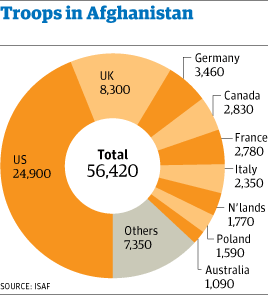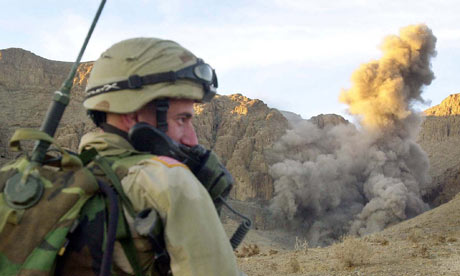A highly critical analysis of the US-led coalition's counterinsurgency in Iraq and Afghanistan has raised serious questions about combat operations in both countries - and the intelligence underpinning them.
The confidential document presents a bleak picture of a counterinsurgency effort undermined by intelligence failures that at times border on the absurd.
Based on scores of interviews with British, US, Canadian and Dutch military, intelligence and diplomatic officials - and marked for "official use only" - the book-length report is damning of a US military often unwilling to share intelligence among its military allies. It depicts commanders in the field being overwhelmed by information on hundreds of contradictory databases, and sometimes resistant to intelligence generated by its own agents in the CIA.
Counterinsurgency efforts are also shown as being at the mercy of local contacts peddling identical "junk" tips around various intelligence officials, with the effectiveness of the intelligence effort being quantified by some senior officers solely in terms of the amount of "tip money" disbursed to sources.
The report describes a rigid reliance on economic, military and political progress indicators regarded by the authors and interviewees as too often lacking in real meaning.
 Its sources complain of commanders who have slipped into relying on "the fallacy of body counts", discredited after the war in Vietnam as a measure of success.
Its sources complain of commanders who have slipped into relying on "the fallacy of body counts", discredited after the war in Vietnam as a measure of success.
The report, prepared by the RAND national defence research institute for US Joint Forces Command in November and leaked to the Wikileaks website, reveals the case of Dutch F-16 pilots in Afghanistan who were ordered by the US to bomb targets, only to be refused access to American "battle damage assessments" showing what they had hit, on the grounds that the Dutch were not "security cleared" to view them.
Another interviewee describes how coalition forces at Camp Holland near Tarin Kowt in southern Afghanistan maintained 13 different intelligence sections, including US, Dutch, UAE, and Australian, all operating with minimal co-operation.
"It would have been helpful [for us to have] combined them; then we would have known everything," complained Lt Neils Verhoef, one of those interviewed for the report. "One section knew the location of an IED [improvised explosive device] factory, and we drove by it for three months."
The unflattering document will make grim reading for President Barack Obama as he grapples with the worsening crisis in Afghanistan, confronted by an increasingly emboldened Taliban and its allies. With counterinsurgency tactics now placed at the centre of the operations in Iraq and Afghanistan, the RAND report suggests that many of the national armed forces involved lack skills to operate effectively.
It calls for a substantial overhaul of how military intelligence is gathered, organised and acted on. Quoting senior officers, it questions many everyday operations - from weapons searches to the killing or arrest of wanted individuals - suggesting that they "alienate" the local population for little measurable gain.
http://www.guardian.co.uk/world/2009/mar/06/us-intelligence-afghanistan





No comments:
Post a Comment